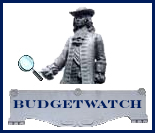- Home
- About
- News
- Tax Reform
- Ethics Reform
- Budget Reform
- Reformer’s Roundtable
- Contact Us







There’s A Hole In The Budget…Then Fix It
 Planning is essential, we are advised, but plans are useless. No sooner is a good plan committed to paper then things change and even the best of plans have to be revised. So it is with the city budget. The news this week is that there’s a hole in the city budget. Now we’ll see how the Mayor and City Council plan to fix it. In doing so, our leaders must not reverse plans to reduce the cost of living and doing business in Philadelphia or reverse efforts to improve the quality of life and the city marketplace or they risk reversing the slow and steady progress the city has made toward ending long-term population and job loss.
Planning is essential, we are advised, but plans are useless. No sooner is a good plan committed to paper then things change and even the best of plans have to be revised. So it is with the city budget. The news this week is that there’s a hole in the city budget. Now we’ll see how the Mayor and City Council plan to fix it. In doing so, our leaders must not reverse plans to reduce the cost of living and doing business in Philadelphia or reverse efforts to improve the quality of life and the city marketplace or they risk reversing the slow and steady progress the city has made toward ending long-term population and job loss.
When the proposed budget for fiscal year 2009 was first crafted in January, it included a number of assumptions that have turned out to be overly optimistic. The proposed budget included savings associated with a bold plan to issue a bond to ensure the future health of the city’s pension system and the stability of future city budgets. While the idea certainly has merit, it appears as if the move will not come soon enough to generate savings in next year’s budget, and further delay may reduce savings assumed in later years of the Five-Year Plan. Similarly, like it or loath it, the delay in the coming of casino gaming to Philadelphia forces the city to delay assumptions related to the arrival of gaming-related revenues and gaming-related budgetary savings.
While tax revenues overall remain steady, a general concern about the weakened national economy and specific concerns about reduced Real Property Transfer Tax revenues have led finance officials to alter growth assumptions for the coming years. With regard to non-tax revenues, the nagging matter of the Philadelphia Eagles owing the city at least $8 million the team should pay as part of its deal to share luxury-box revenues at Veterans Stadium continues and when it comes to the team paying up, it looks as if — much like a Superbowl win — we’ll have to wait ‘til next year.
On the spending side, improved pension fund performance has reduced some pension-related costs, bond refinancing has reduced debt-service costs, and expenditures in general project to be slightly lower for the current year. That is all for the good, but questions about growth in criminal-justice and prison-related costs as well as a general uncertainty about whether the Nutter administration will be able to negotiate an agreement with the city’s four municipal unions without adding costs to the budget and Five-Year Plan temper some of the good news.
In the end, it seems that, no matter how one looks at it, there’s a hole in the budget and the Mayor and City Council will have to make some adjustments to the budget and Five-Year Plan to fix it. On the revenue side, our leaders would be wise to pursue efforts to improve city tax collections so that those who owe, pay. Similarly, Philadelphia has been slow to follow the lead of other cities that have generated revenues from improved rights-of-way management, assets sales, and marketing initiatives. On the expense side, the city has a wonderful opportunity to embrace the array of programs working in other cities to link expenditures to performance and inspire effective and efficient government operations.
One idea that should be rejected immediately is any notion of stopping the city’s tax-reduction program. The city's modest tax reductions have slowly and steadily improved the city's competitiveness and the gap between national job growth and city job growth has been almost cut in half since the city began its tax reductions. Without continued improvement in our tax competitiveness, there is no reason to believe that Philadelphia will do anything but continue to lose jobs and lag economically.
In his policy paper, AN HONEST BUDGET NOW, candidate Nutter declared, “As Mayor, I will continue my leadership in reforming the self-defeating tax structure in Philadelphia with responsible and reliable changes.” More important, he noted the strong connection between improving the city’s tax competitiveness and growing the city economy to expand city revenues:
The experience of the past five years, the expert opinion of every economist who has studied the issue, and the recommendations of the Charter-mandated Tax Reform Commission all agree that these proposals will make taxation in Philadelphia fairer and more efficient, will not lower City revenues for the provision of public services, and will stimulate growth and investment in Philadelphia.
The challenges to adopt a balanced budget and a reasonable Five-Year Plan for the city are real, but not insurmountable. Of course, more things will change in the future, which will send our leaders back to the drawing board in just a few months’ time to begin the process all over for next year. That is just the nature of budgetary planning. The key is to make the smart decisions today that help lead to growth in the future. Short-sighted decisions today will undoubtedly result in continued decline.
